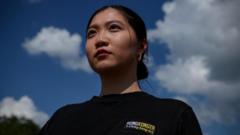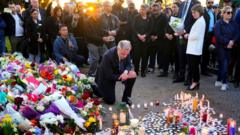In a notable turn of events during Canada's federal election, Joe Tay, a journalist and actor known for his outspoken criticism of the Chinese government, is contending with extraordinary challenges. The candidate, who is running for a parliamentary seat in Don Valley North—a Toronto district with a significant Chinese-Canadian population—has been forced into a subdued campaign style due to safety concerns.
With a Target on His Back, Joe Tay Faces Challenges in Canada's Election

With a Target on His Back, Joe Tay Faces Challenges in Canada's Election
Amid a growing campaign of intimidation, a Conservative candidate's election bid highlights international tensions and domestic implications.
Days ahead of the election, the situation escalated when Canadian officials disclosed that Tay's candidacy had become the target of organized attacks on social media, primarily from Chinese-language platforms associated with the Chinese government. This comes after China placed a bounty of approximately $130,000 on Tay's head, seeking information that could facilitate his arrest, which adds a perilous layer to his campaign.
Despite the mounting intimidation, Tay remains resolute, focusing on advocating for democratic freedoms in Hong Kong and confronting China's increasing authoritarianism. However, the atmosphere of fear has compelled him to limit his public appearances, avoiding in-person engagements with voters and skipping traditional campaign events that mobilize other candidates.
Officials have revealed that misinformation campaigns have sought to undermine Tay's reputation, painting him as a criminal to dissuade voters in what is known to be one of Canada's most crucial electoral battlegrounds. As Vanessa Lloyd, head of Canada's intelligence agency, indicated, the tactics employed reflect a broader strategy to influence electoral outcomes in favor of the ruling party in China, potentially affecting the democratic process in Canada.
In a climate where the stakes are high, Joe Tay embodies the complex interplay between local politics and global geopolitical concerns, exemplifying the impact of international issues on the microcosm of election campaigns. As Canadians prepare to vote, the implications of Tay’s bravery against the odds resonate far beyond the borders of Canada, raising questions about foreign influence in domestic affairs and the resilience of democratic institutions.
Despite the mounting intimidation, Tay remains resolute, focusing on advocating for democratic freedoms in Hong Kong and confronting China's increasing authoritarianism. However, the atmosphere of fear has compelled him to limit his public appearances, avoiding in-person engagements with voters and skipping traditional campaign events that mobilize other candidates.
Officials have revealed that misinformation campaigns have sought to undermine Tay's reputation, painting him as a criminal to dissuade voters in what is known to be one of Canada's most crucial electoral battlegrounds. As Vanessa Lloyd, head of Canada's intelligence agency, indicated, the tactics employed reflect a broader strategy to influence electoral outcomes in favor of the ruling party in China, potentially affecting the democratic process in Canada.
In a climate where the stakes are high, Joe Tay embodies the complex interplay between local politics and global geopolitical concerns, exemplifying the impact of international issues on the microcosm of election campaigns. As Canadians prepare to vote, the implications of Tay’s bravery against the odds resonate far beyond the borders of Canada, raising questions about foreign influence in domestic affairs and the resilience of democratic institutions.


















